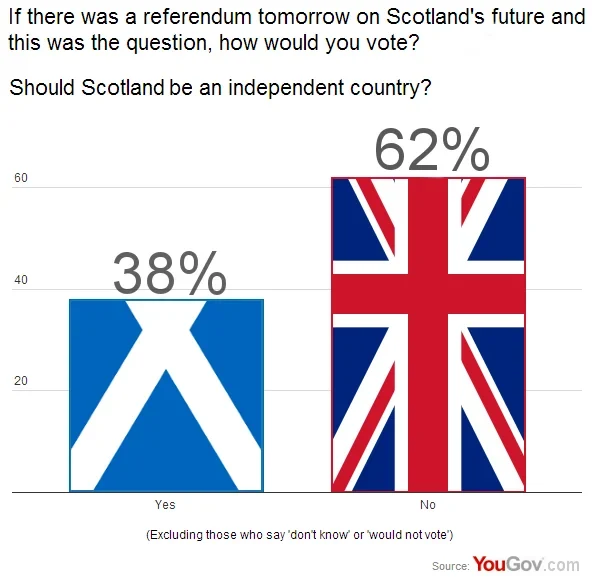If Alex Salmond is to live his dream, he has one big hurdle to surmount - but also one big opportunity to seize.
His hurdle is that Scottish voters overwhelmingly align their attitudes to independence to their party allegiance - and there are simply too few Scottish National Party supporters to deliver a "yes" majority.
Want to receive Peter Kellner's commentaries by email? Subscribe here
With twelve months to go until the referendum, YouGov’s survey for The Times finds that the "no" camp enjoys a commanding 62-38% lead, once we strip away those who don’t know or say they won’t vote. This is typical of polls conducted in the past two years. SNP supporters divide 85-15% for independence; supporters of other parties prefer the union by much the same overwhelming margin.

If Salmond can boost support for the SNP he can lift the "yes" vote; but on its own that won't be nearly enough. To win the referendum the First Minister must reduce hostility to independence among Conservatives, Liberal Democrats and, above all, Labour supporters.
How could he do this? One option is to play the Tory England card. The referendum will be held barely six months before the next UK-wide general election campaign gets under way. Suppose the Conservatives have moved ahead in the polls, and Scottish voters are convinced that David Cameron will remain Prime Minister. Mr Salmond could offer a "yes" vote as a way to escape the fate of an alien right-wing government lording over Scotland from London.
Our poll suggests that this argument would make a difference - but not a large one; at least not yet. The "yes" vote among Labour supporters would rise from 17% to 22%. Overall the "no" lead would narrow from 62-38% to 59-41% - still a hefty majority for the union.
Mr Salmond’s real opportunity is to reframe the “yes” option away from full separation (which most Scots have always rejected) and towards a continuing but looser relationship with the rest of the United Kingdom. Our survey finds that most Scots want decisions on welfare benefits, pensions, taxes and drugs to be taken in Holyrood rather than Westminster – precisely the kind of things that Mr Salmond says only a “yes” vote can deliver. Significantly, up to half of Labour and Liberal Democrat supporters warm to these ideas, even if the small number of Conservatives do not. (We also tested immigration: here Scots divide evenly on whether this should be decided in Edinburgh or London.)
These results are consistent with past YouGov findings, when Mr Salmond proposed that the referendum should contain a third option – “devo-max”: that is, more devolved powers for Scotland but not full independence. In the end the First Minister had to drop this third option; but if he can persuade his fellow Scots that a “yes” vote is the way to achieve these practical changes, then the referendum result could yet be close.
Equally, the challenge to Alistair Darling and the “Better Together” campaign is to go beyond their argument that a “yes” vote means inevitable, full separation, however warmly Mr Salmond speaks of continued co-operation across the border. They need to show that a “no” vote does not confine Scotland to the status quo, but rather that it is the way to achieve further, sensible devolution without risking the “dangers” of independence.
In a way, the next twelve months will be a contest to capture the hearts and minds of the people whose real preference will not be on the ballot paper. In London, people debate who is the “heir to Blair”. In Scotland, the result next September could turn on whether Scots regard Mr Salmond or Mr Darling as the true heir to “devo max”.
This commentary originally appeared in the Times
See the YouGov / Times results
Want to receive Peter Kellner's commentaries by email? Subscribe here







